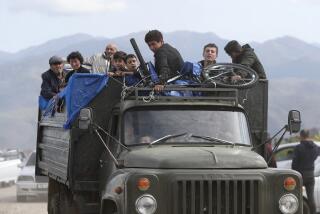Kyrgyzstan Faces Test at Ballot Box
BISHKEK, Kyrgyzstan — The printing press in an old warehouse on the outskirts of town was gearing up to print a crucial preelection issue of the MSN opposition newspaper last week when the lights went out.
It seemed, a government official said apologetically, that the plant’s licenses weren’t in order.
It seemed more likely to officials at the Media Support Center, the U.S. State Department-funded organization that operates the plant, that it was the facility’s politics that weren’t in order.
In a scene straight out of “The Front Page,” the U.S. Embassy trucked over two small generators -- enough to get the press rolling at a crawl. Working all night, the printers coaxed copies of MSN off the crippled press, bringing news that thousands of people in remote corners of the country were blocking highways to protest the disqualification of opposition candidates from this weekend’s parliamentary elections.
It also brought a large front-page headline addressed to the government of President Askar A. Akayev: “Your Time Has Run Out -- Step Down.”
Today’s election is widely seen as a test of whether the seeds of democracy planted recently in countries such as Ukraine and Georgia can take root in the repressive mountain republics of Central Asia.
If election results are falsified, and if Akayev backs away from his pledge to step down later this year after 15 years in power, some believe Kyrgyzstan could become the scene of mass protests like the Rose and Orange revolutions that brought down the governments of Georgia and Ukraine. In fact, the opposition here already is sporting yellow scarves like the orange neck-gear adopted on the streets of Kiev. From the Kyrgyz capital of Bishkek to the provinces, there is talk of a Tulip Revolution.
“If there are violations, it may result in mass protest actions throughout the country. And then it will be difficult to predict what will happen,” said Orozbek Moldaliyev, an independent political analyst. “People have seen the events in Ukraine and Georgia, and they want freedom too. And people, frankly speaking, are tired of Akayev.”
Akayev, 60, a former physicist who was once called the Thomas Jefferson of Central Asia, is an articulate intellectual who brought political pluralism and speedy market reform to the most repressive region in the former Soviet Union.
But critics have begun to doubt that the increasingly authoritarian leader will relinquish power when his constitutionally limited mandate expires this year.
For most of last week, more than 3,000 residents blocked the main road to China near the town of Kochkor, protesting the removal of popular parliamentary candidates Akylbek Japarov and Beishenbek Bolotbekov from the ballot. They are among an estimated 90 candidates who have been de-registered or have withdrawn, often under government pressure.
Standing resolutely in a biting wind that blew frozen dust and frost into their faces, protesters announced they had also captured the district administration building after the local governor reportedly jumped out the window and fled, along with the local prosecutor and judge.
“There is no power anymore. It’s now only me and my voters. For us, the revolution has already taken place in this one district,” Japarov declared before ending the roadblock Friday and calling on his supporters to vote against all candidates on the ballot
“Until they are back in the race, we are staying here. The president wants to have his own man here, and we will not allow it,” Cholpom Sydykova, 46, said earlier in the week.
“We will starve. We will stay here till the end -- until we die or win,” added Ralchimov Irbakiyev, 34, an unemployed laborer.
Half of Kyrgyzstan’s 5 million residents live below subsistence levels. The average pension is $15 a month, and government salaries average $30 a month, setting the stage for large-scale corruption.
MSN’s campaign to expose millions of dollars in business deals that have allegedly gone into the hands of Akayev’s family led to a series of defamation suits, heard in government-controlled courts, that twice effectively closed Editor Alexander Kim’s newspapers. The president himself openly declared war on the newspaper Feb. 17, accusing it of “systematic information terror.”
Akayev’s tirade against MSN followed a large, front-page photo of an elaborate mansion under construction in central Bishkek that MSN alleged was designed by Akayev’s wife as a private residence but paid for with government funds.
“Fifteen years ago when he came to power, we had a powerful economy and a well-developed agricultural sector,” Kim said in an interview. “Even today, we have the richest deposits of gold and rare metals in our country -- and to live in such conditions?”
Almost at the same time that it was turning out the lights on MSN’s printing press, the government was pulling the plug on the only source of radio news outside its control, the U.S.-backed Radio Free Europe/Radio Liberty. The station was shut down Thursday.
The U.S. government has openly advocated free parliamentary elections and a fulfillment of Akayev’s pledge for a “democratic transition” when his term ends.
“We’re just trying to create a level playing field, so it will create a process that is believed by the people,” U.S. Ambassador Stephen M. Young said in an interview. “The prospect of a peaceful democratic transition in Kyrgyzstan would be a tremendous advance for democracy, and not only here, but as a symbol in the rest of Central Asia.”
Washington’s view carries some weight in Kyrgyzstan, one of America’s most important allies in the war on terrorism. The nation is the largest recipient of American aid in Central Asia, in part because of the U.S. air base near Bishkek, a key supply point for the war in Afghanistan.
But Kyrgyzstan shares a growing unease with neighboring Russia, which maintains a base of its own in Bishkek, over Washington’s advocacy in the region. Instead of democracy building, the two nations see an attempt to install a network of Western-allied governments across the former Soviet territory.
Akayev went so far as to compare the U.S. efforts to the Bolshevik dream of exporting the communist revolution around the world.
“Kyrgyzstan’s principal interest at this time consists in building a friendly alliance with Russia,” he wrote last year in the Russian newspaper Rossiiskaya Gazeta.
But he also emphasized that Kyrgyzstan hoped that it didn’t have to choose. “Kyrgyzstan believes that its land should serve as a location for the cooperation and the convergence of the interests of Russia and the United States, and not as an arena for their confrontation,” he said.
Most observers expect that a showdown might not occur until later this year, when it will become clear whether Akayev intends to seek a constitutional referendum to allow him to run again in presidential elections in October. Already, a citizens group has collected half of the 300,000 signatures needed to put such a measure on the ballot.
“When we talk to people, they all raise the same question: If a person works and his performance is great, if he delivers what he promises ... why change horses in midstream?” said Amanbay Satybaev, who is leading the signature campaign.
At the moment, the opposition appears to have no horse at all. Unlike Georgia and Ukraine, where Mikheil Saakashvili and Viktor Yushchenko had coalesced a range of opposition groups before taking on entrenched leaders, Kyrgyzstan’s opposition remains fractured. The most popular opposition figure, former Security Minister Felix Kulov, is serving a seven-year prison term on what his supporters say are trumped-up embezzlement charges.
Akayev is apparently trying to hedge his bets by securing a two-thirds majority in the parliament, which also could launch a referendum.
Not only is the pro-presidential Alga, Kyrgyzstan! Party making a large push in every parliamentary district, but several of Akayev’s family members and close associates are candidates. The parliamentary ballot includes his daughter and son and his wife’s sister.
“I was told that if I don’t vote for Bermet Akayeva [the president’s daughter], I will face dire consequences,” said Gulzhana Umbertova, a 21-year-old psychology student at Bishkek State University.
“I want the U.S. to interfere. I want the world at large to interfere,” said Tariel Bektemirov, 18, a journalism student. “Right now, what we want is anything but Akayev. These road protests are a good thing. It sends a message from the people that they are ready for revolution.”
If there is a peaceful citizens revolt, it will be Kyrgyzstan’s second. The first, the Silk Revolution in 1991, propelled Akayev, who had been selected a year earlier as president, into the role of a democratic hero. Under his leadership, Kyrgyzstan implemented industrial privatization and private land reform and permitted an open press.
But in recent years Akayev has moved to sharply consolidate his power and concentrate wealth in the hands of the group of associates and relatives known as his Family.
“We were so happy with our Silk Revolution that we simply didn’t notice when we lost control of him,” said Edil Baisalov, chairman of the Coalition for Democracy and Civil Society.
“They say that power corrupts. He has become corrupt, his family is corrupt, and whoever is elected to replace him, I can tell you, next time we will control him like this,” he said. He took the tip of his thumb and rubbed it firmly on his desk.
More to Read
Sign up for Essential California
The most important California stories and recommendations in your inbox every morning.
You may occasionally receive promotional content from the Los Angeles Times.










